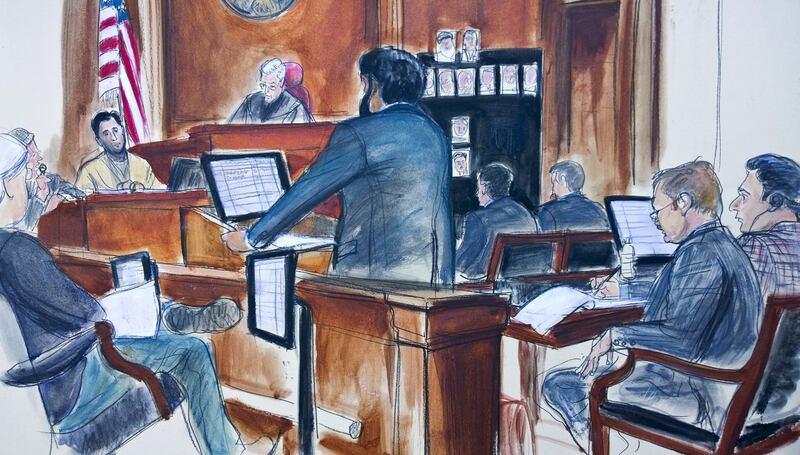A gold trader has revealed how he made as much as $150 million from a complex financial scheme to allow Iran to avoid US sanctions as he gave evidence in the New York trial of a Turkish banker.
Reza Zarrab, 34, is the key witness in the prosecution of Mehmet Hakan Atilla, who denies any involvement.
The case has already disrupted relations between the US and Turkey after Zarrab claimed Recep Tayyip Erdogan, then Turkey’s prime minister and now its president, ordered two Turkish banks to join the alleged plot.
On Tuesday, under cross-examination, Zarrab lifted the lid on his enormous wealth, explaining how he took a commission on the millions of dollars flowing through a network of banks, front companies and money exchanges.
He said he was carrying more than $100,000 in cash when he was arrested in Miami last year and that he had bribed an American prison guard with $45,000 – an admission that brought gasps and laughter from Turkish journalists who packed an overflowing room to hear his testimony.
After four days describing how he used fake gold and food deals to camouflage a scheme to ease Iranian oil money out of Turkish banks, on Tuesday he was cross-examined by Atilla’s defence team.
_______________
Read more:
[ Turkey rounds up associates of gold trader who plotted to avoid US sanctions against Iran ]
_______________
Cathy Fleming questioned his motivation for co-operating with American prosecutors, suggesting he was fleeing legal problems in Iran, and asked how much money he had made from the scheme.
“I don’t recall how much exactly,” he answered.
She replied: “How about generally…?”
“I don’t remember exactly but could be about $100 million, it could be more than that, maybe $150 million,” he said.
Atilla’s defence team have questioned Zarrab’s credibility, saying he has powerful reasons for embellishing the prosecution’s case.
In particular, Ms Fleming asked him about a string of offences which would not be prosecuted if he helped the US government – including smoking synthetic marijuana inside a federal jail facility – whether his living conditions had improved since being allowed into FBI custody last month, and whether he was furious that he had not been able to avoid prosecution.
“I don’t have any anger towards anyone, ma’am,” he answered.
He described the lengths he went to in order to try to secure his release, pursuing political channels and hiring Rudy Giuliani, the former mayor of New York and Michael Mukasey, a former attorney general, to make his case.
Throughout, Zarrab, who holds Iranian and Turkish nationality, answered politely and at length.
At times Ms Fleming expressed exasperation at his answers, which were filled with corrections and qualifications, before resorting to asking him repeatedly to answer simply yes or no.
She asked whether the prosecution knew he had not been to Iran in recent years because of concerns about legal problems.
“That’s because of my lifestyle,” he said.
“Not legal, business problems,” asked Ms Fleming. “Yes or no?”
“Under normal circumstances there should not be any concerns,” he said.
“How about now...?”
“Certainly there is,” he finally said.
Zarrab arrived with his family in Miami last year. He was arrested at the airport and said he was on a family holiday to visit Disney World.
When Ms Fleming asked him whether he had arrived with $103,000 in cash, he politely corrected her.
“$102,000, ma’am,” he said, to another ripple of laughter.
Ms Fleming continued: “And that was for your trip to Disney World?”
“This was the money that would be needed for our trip that was for 10 days, that was for seven people,” he said.
Even in detention, the spending continued, as he described how he used a Turkish attorney to deliver a $45,000 bribe to a member of jail staff. In return, he used the guard’s cell phone to call members of his family and legal team at home.
He said he even paid other prisoners to use their phone time and save a place in the computer room so he did not have to queue.
The cross-examination will continue on Wednesday.
Meanwhile, Mr Erdogan continued to express his anger at the trial, which he denounced as a conspiracy to “blackmail” his country.
He accused the US of using the trial as a distraction while Washington tried to strengthen Syrian Kurdish groups which his government views as terrorists.
“Turkey has no plans against the United States, but it is clear that the US has plans against us,” he said.






